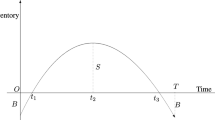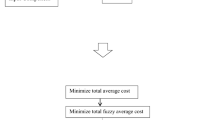Abstract
The supply chain is a network system composed of interconnected members such as suppliers, manufacturers, wholesalers, retailers, and end customers. Inventory plays a major role in supply chain management, but it directly affects the cost and service quality of the entire supply chain system. Inventory control is not only closely related to a single enterprise itself but also closely related to all enterprises in the supply chain. Aiming at the problems of low standardization in the field of power material management, material procurement plans, and material demand plans are out of touch, and material inventory is too high. Fuzzy logic is used to model and manage demand patterns, lead times, and other factors in a sophisticated way. Meanwhile, particle swarm optimization is employed to find optimal or near-optimal solutions in complex spaces. Therefore, the novel fuzzy hybrid particle swarm optimization (FHPSO) algorithm is proposed to analyze the problems of power material inventory management, improve effectiveness of the inventory management, and cost reduction of logistic management. The demand characteristics of electric power materials are analyzed and extracted based on historical consumption data. The overall inventory control strategy of electric power materials is designed to build its dynamic inventory control strategy for various power materials. Realize the optimization and adjustment of inventory management, which can effectively enhance the efficiency of inventory management and reduce the logistics management cost of the enterprise. The experimental result proved that the FHPSO approach achieved superior performance by evaluating it with other existing approaches using various evaluation measures such as computational time, computational cost, error rate, and prediction accuracy.

















Similar content being viewed by others
Availability of data and material
The data that support the findings of this study are available from the corresponding author upon reasonable request.
References
Ma S, Zhang Y, Liu Y, Yang H, Lv J, Ren S (2020) Data-driven sustainable intelligent manufacturing based on demand response for energy-intensive industries. J Clean Prod 274:123155
Stavrakas V, Flamos A (2020) A modular high-resolution demand-side management model to quantify benefits of demand-flexibility in the residential sector. Energy Convers Manage 205:112339
Okur Ö, Voulis N, Heijnen P, Lukszo Z (2019) Aggregator-mediated demand response: minimizing imbalances caused by uncertainty of solar generation. Appl Energy 247:426–437
Tsay C, Kumar A, Flores-Cerrillo J, Baldea M (2019) Optimal demand response scheduling of an industrial air separation unit using data-driven dynamic models. Comput Chem Eng 126:22–34
Vázquez-Canteli JR, Nagy Z (2019) Reinforcement learning for demand response: a review of algorithms and modeling techniques. Appl Energy 235:1072–1089
Nazari L, Seifbarghy M, Setak M (2018) Modeling and analyzing pricing and inventory problem in a closed-loop supply chain with return policy and multiple manufacturers and multiple sales channels using game theory. ScientiaIranica 25(5):2759–2774
Raza SA (2018) Supply chain coordination under a revenue-sharing contract with corporate social responsibility and partial demand information. Int J Prod Econ 205:1–14
Li Z, Hai J (2019) Inventory management for one warehouse multi-retailer systems with carbon emission costs. Comput Ind Eng 130:565–574
Guo Jun (2018) Analysis of emergency material supply network of electric power enterprises based on reserve mode. University of Chinese Academy of Sciences
Ahmad S, Ahmad A, Naeem M, Ejaz W, Kim HS (2018) A compendium of performance metrics, pricing schemes, optimization objectives, and solution methodologies of demand side management for the smart grid. Energies 11(10):2801
Guo Z, Zhang R, Wang L, Zeng S, Li Y (2021) Optimal operation of regional integrated energy system considering demand response. Appl Therm Eng 191:116860
Wang F, Lu X, Chang X, Cao X, Yan S, Li K, Duić N, Shafie-Khah M, Catalão JP (2022) Household profile identification for behavioral demand response: A semi-supervised learning approach using smart meter data. Energy 238:121728
Ding Y, Bai Y, Tian Z, Wang Q, Su H (2023) Coordinated optimization of robustness and flexibility of building heating systems for demand response control considering prediction uncertainty. Appl Thermal Eng 120024
Alamir N, Kamel S, Megahed TF, Hori M, Abdelkader SM (2023) Developing hybrid demand response technique for energy management in microgrid based on pelican optimization algorithm. Electric Power Systems Res 214:108905
Wang M, Wang R, Liu J, Ju W, Zhou Q, Zhang G, Wang M (2022) Operation optimization for park with integrated energy system based on integrated demand response. Energy Rep 8:249–259
Kirkerud JG, Nagel NO, Bolkesjø TF (2021) The role of demand response in the future renewable northern European energy system. Energy 235:121336
Peinado-Guerrero MA, Villalobos JR (2022) Using inventory as energy storage for demand-side management of manufacturing operations. J Clean Prod 375:134213
Morales-España G, Martínez-Gordón R, Sijm J (2022) Classifying and modelling demand response in power systems. Energy 242:122544
Song Q, Zhao Q, Wang S, Liu Q, Chen X (2020) Dynamic path planning for unmanned vehicles based on fuzzy logic and improved ant colony optimization. IEEE Access 8:62107–62115
Wang R, Hao K, Chen L, Wang T, Jiang C (2021) A novel hybrid particle swarm optimization using adaptive strategy. Inf Sci 579:231–250
Kaasgari MA, Imani DM, Mahmoodjanloo M (2017) Optimizing a vendor managed inventory (VMI) supply chain for perishable products by considering discount: Two calibrated meta-heuristic algorithms[J]. Comput Ind Eng 103:227–241
Acknowledgements
Not applicable.
Funding
Not applicable.
Author information
Authors and Affiliations
Contributions
HS, ZG, LF, JZ, and HS agreed on the content of the study. HS, ZG, LF, JZ, and HS collected all the data for analysis. HS, ZG, LF, JZ, and HS agreed on the methodology. HS, ZG, LF, JZ, and HS completed the analysis based on agreed steps. Results and conclusions are discussed and written together. The author read and approved the final manuscript.
Corresponding author
Ethics declarations
Conflict of interest
The authors declare that they have no conflict of interest.
Human and animal rights
This article does not contain any studies with human or animal subjects performed by any of the authors.
Informed consent
Informed consent was obtained from all individual participants included in the study.
Consent to participate
Not applicable.
Consent for publication
Not applicable.
Additional information
Publisher's Note
Springer Nature remains neutral with regard to jurisdictional claims in published maps and institutional affiliations.
Rights and permissions
Springer Nature or its licensor (e.g. a society or other partner) holds exclusive rights to this article under a publishing agreement with the author(s) or other rightsholder(s); author self-archiving of the accepted manuscript version of this article is solely governed by the terms of such publishing agreement and applicable law.
About this article
Cite this article
Shi, H., Gao, Z., Fang, L. et al. Research on inventory control method based on demand response in power system fuzzy hybrid particle swarm optimization algorithm. Electr Eng (2024). https://doi.org/10.1007/s00202-024-02303-0
Received:
Accepted:
Published:
DOI: https://doi.org/10.1007/s00202-024-02303-0




